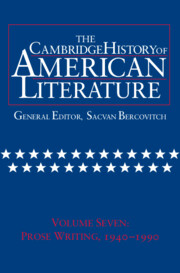Book contents
- Frontmatter
- Introduction
- The Drama, 1940—1990
- Fiction and Society, 1940–1970
- After the Southern Renascence
- 1 Introduction
- 2 Robert Penn Warren
- 3 Carson McCullers
- 4 Flannery O’Connor
- 5 Eudora Welty
- 6 Novels of Race and Class
- 7 Novels of Slavery and Reconstruction
- 8 Walker Percy
- 9 Reynolds Price
- 10 Peter Taylor
- Postmodern Fictions, 1960–1990
- Emergent Literatures
- Appendix: Biographies
- Chronology, 1940–1990
- Bibliography
- Index
10 - Peter Taylor
from After the Southern Renascence
Published online by Cambridge University Press: 28 March 2008
- Frontmatter
- Introduction
- The Drama, 1940—1990
- Fiction and Society, 1940–1970
- After the Southern Renascence
- 1 Introduction
- 2 Robert Penn Warren
- 3 Carson McCullers
- 4 Flannery O’Connor
- 5 Eudora Welty
- 6 Novels of Race and Class
- 7 Novels of Slavery and Reconstruction
- 8 Walker Percy
- 9 Reynolds Price
- 10 Peter Taylor
- Postmodern Fictions, 1960–1990
- Emergent Literatures
- Appendix: Biographies
- Chronology, 1940–1990
- Bibliography
- Index
Summary
Peter Taylor has had two separate careers, one, stretching from the mid-1950s to the mid-1980s, as a writer of short stories, the other, commencing in 1986 with A Summons to Memphis, as a novelist. The métier of his stories is upper-middle-class life in middle Tennessee. He has a special gift, in such stories as “A Wife of Nashville” and “Cookie,” for portraying the complicated relationships between upper-middle-class white families and their African American cooks. He also is a master of tales of delicate grotesquerie and sexual uneasiness in such stories as “A Spinster’s Tale,” and “Venus, Cupid, Folly, and Time,” tales that owe some of their strangeness of atmosphere to Carson McCullers but that are also presented with a restraint and understatement unlike that of any other writer of the Southern tradition. Finally, in such stories as “Heads of Houses,” and “In the Miro District,” Taylor captures generational conflicts that are also cultural conflicts, and, since the children are usually less self-consciously Southern than the adults, regional conflicts as well.
In A Summons to Memphis, Taylor also treats a generational quarrel that is also a regional one, in that the entanglement of the protagonist’s family history is also an entanglement with his native region, and fleeing the former is a way of fleeing the latter. The novel provides a metaphorical way of describing the literary predicament of a belated generation of Southern novelists, a generation that must sever its consuming ties with the Renascence generation but must also risk its vitality as novelists if it succeeds in breaking the tie.
- Type
- Chapter
- Information
- The Cambridge History of American Literature , pp. 421 - 424Publisher: Cambridge University PressPrint publication year: 1999

